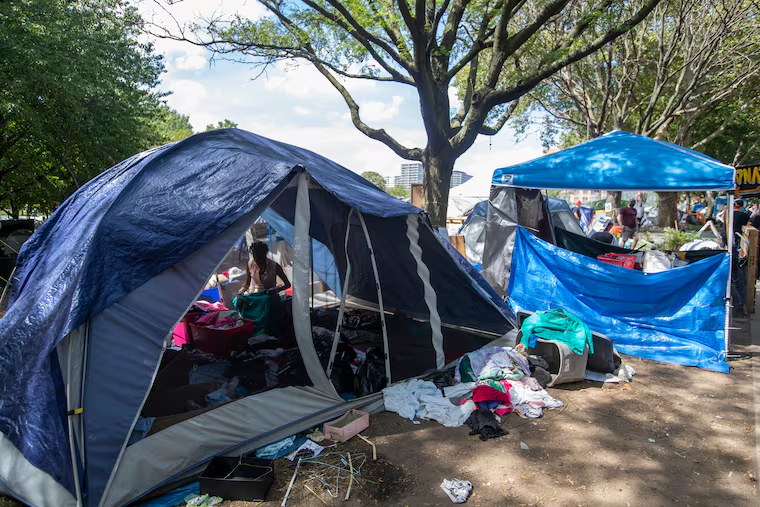Even with judge’s sign-off, criminalizing encampments isn’t the solution to Philly’s housing problem | Opinion
The punitive response to encampments that many believe to be necessary — and that a judge just declared legal — is neither humane nor practical.

Since June, three homeless tent encampments have emerged in the Logan Square and Sharswood neighborhoods. One, which residents call Camp James Talib-Dean, occupies a softball field just off the Ben Franklin Parkway. The other, Azalea Gardens, sits behind the Philadelphia Museum of Art. The third, Camp Teddy, fronts the new $45 million headquarters of the Philadelphia Housing Authority (PHA). With notable exceptions of Councilmembers Jamie Gauthier and Kendra Brooks, city officials have tended to support closing the encampments.
Residents and officials are right to be concerned: no one should be unhoused and living in a tent. But the punitive step that many believe to be necessary — immediate sweeps of the encampments — is neither humane nor practical. A federal judge ruled Tuesday that the city can clear the encampments. But institutions including the Centers for Disease Control and Prevention condemn such sweeps during a pandemic. In other cities, like San Diego, Calif., and Portland, Ore., sweeps haven’t curbed the number of homeless, while they have cost taxpayers thousands in enforcement — to say nothing of the position many unhoused people are left in after being removed, usually worse than before with a tougher path to exiting homelessness. Beyond misusing resources, sweeping encampments too often destroy people’s belongings, including their tents, IDs, and other important documents, medications, and mementos.
» READ MORE: Federal judge allows city to clear out homeless encampments on Benjamin Franklin Parkway and in N. Philly
Absent a real effort to confront our accumulating housing crisis, we are likely to see more encampments, which have grown since the financial crisis of 2007-08. According to a study from the National Law Center on Homelessness and Poverty, a nonpartisan legal advocacy group for the unhoused, there were 19 encampments reported in the media in 2007. They grew every year through 2016, when there were 274 — a cumulative increase of 1,342%. A recent study by Columbia University economist Brendan O’Flaherty suggests that job losses from the pandemic will swell the unhoused population by 40%-45% across the U.S. — an increase of over 250,000 people living on the streets.
Philadelphia is not exempt from these trends. Prior to the COVID-19 pandemic and the associated economic crisis, over 125,000 Philadelphians paid over half their income in homeownership costs or rent. Options for the housing insecure are few — and dwindling.
The Philadelphia Housing Authority maintains thousands of publicly owned vacant and viable buildings, making it the state’s largest landlord. Meanwhile, 40,000 people are on the PHA waitlist, closed for new applications since 2013. Despite this, the agency is reducing its total stock of units, and many are concerned that it may be encouraging gentrification in the process. Last year, PHA sold 144 vacant properties to developers. That same year, it announced plans to sell two public housing towers to a private developer to build market-rate housing, arousing concerns of displacement among residents and Councilmembers Gauthier and Isaiah Thomas.
In theory, Section 8 vouchers offer the possibility of using federal subsidies for housing anywhere in the city. But fewer than one-quarter of those eligible for federal housing subsidies receive them. The vouchers only assist each recipient for 12 to 24 months. About two-thirds of Philadelphia landlords discriminate against voucher holders and refuse to accept them — a practice both illegal and widespread.
» READ MORE: Organizers and city officials still talking as Day 50 of the Parkway homeless encampment dawned
Meanwhile, the shelter system is in a state of crisis. The Office of Homeless Services reports that in fiscal year 2019, it was only able to provide financial assistance to approximately 28% of the over 7,000 households who came to their office saying that they were in imminent danger of becoming homeless. Only 1,131 families received prevention support in FY ’19. Nearly 3,000 families were turned away from this type of cost-effective assistance. The future of these families would be to enter emergency shelter, live in their car, double up with family or friends, or in some cases return to abusive homes. From 2009 to 2019, the number of emergency shelter units available for families decreased by 11%, and the number of beds available for families decreased by 8%.
Transitional housing also saw a sharp decline. From 2009 to 2019, the number of transitional housing units available for families decreased by 56%, and the number of available beds decreased by 64%. All of these statistics add up to a picture in which rising homelessness is inevitable — until we attack the root of the problem.
» READ MORE: Philly’s housing insecurity crisis needs long-term solutions | Opinion
Residents of Logan Square and Sharswood who are offended by encampments in their communities are right to be dismayed. This is why we all need to fight for long-term investments in housing for poor and working-class people, including taking property, especially vacant property, into nonprofit community land trusts to make them permanently affordable. And until PHA can reverse its trend of selling off housing to developers, its scattered-site stock should be transferred to similar neighborhood-based nonprofit trusts which can redevelop properties for affordable housing and shrink the waitlist by quickly moving people into housing.
Rather than criminalizing homelessness and encampments, we have the opportunity to fight for housing justice for all our neighbors. We have the resources. Now that the encampments are increasingly visible, we may also have the will.
Nikil Saval is the Democratic nominee for state Senate in the 1st Senate District and a writer. Stephanie Sena is the anti-poverty fellow at Villanova’s Charles Widger School of Law and founder of the Student-Run Emergency Housing Unit of Philadelphia.